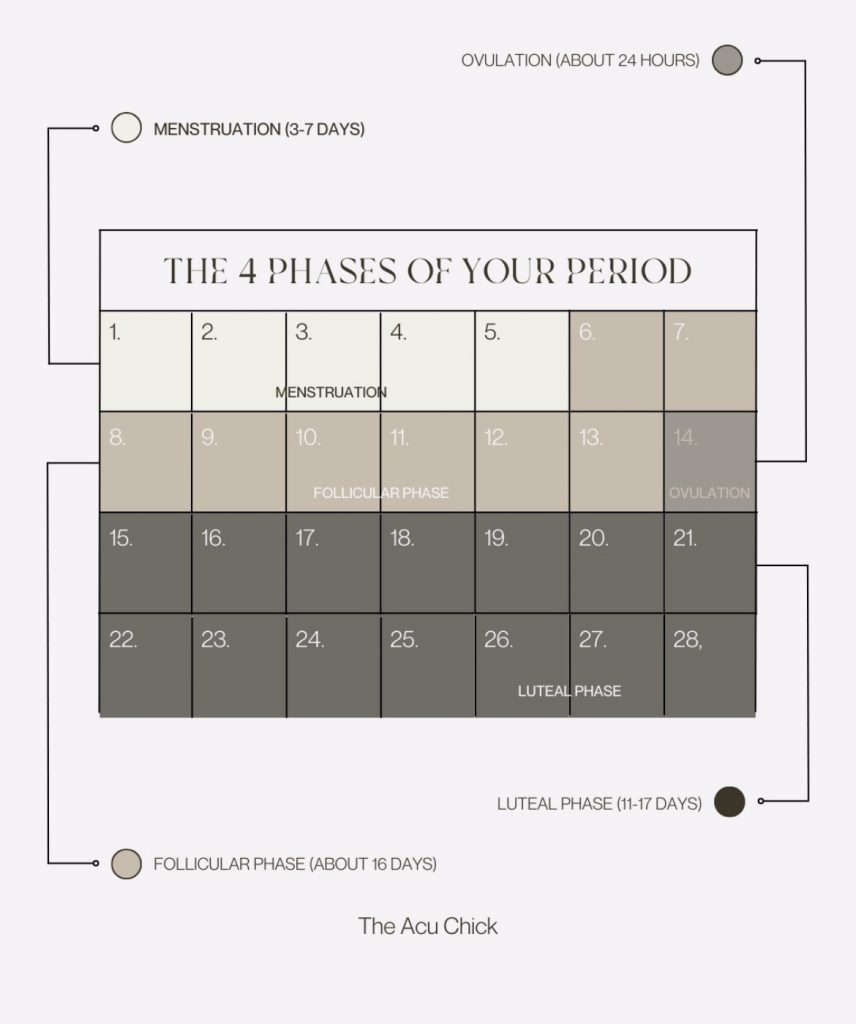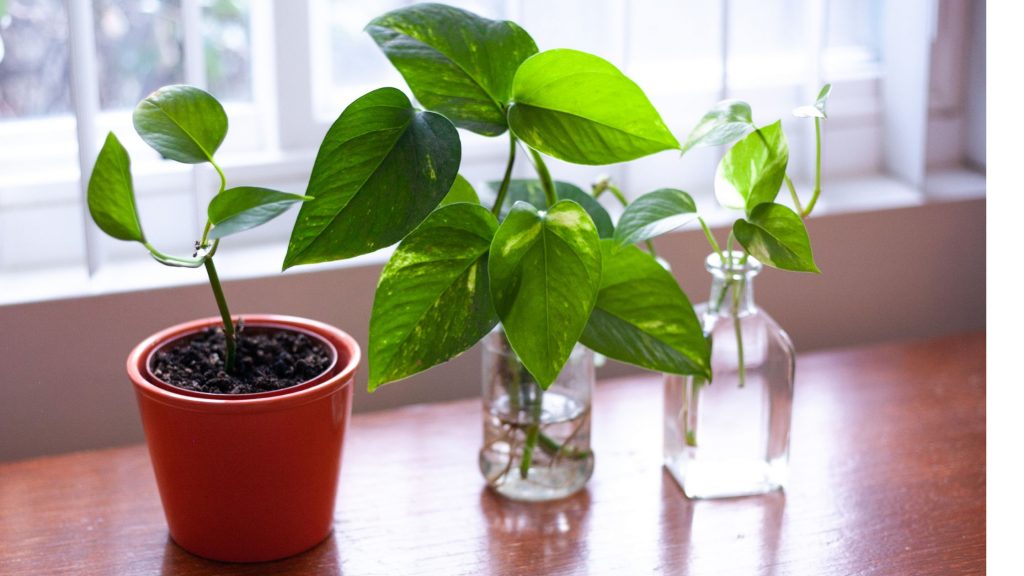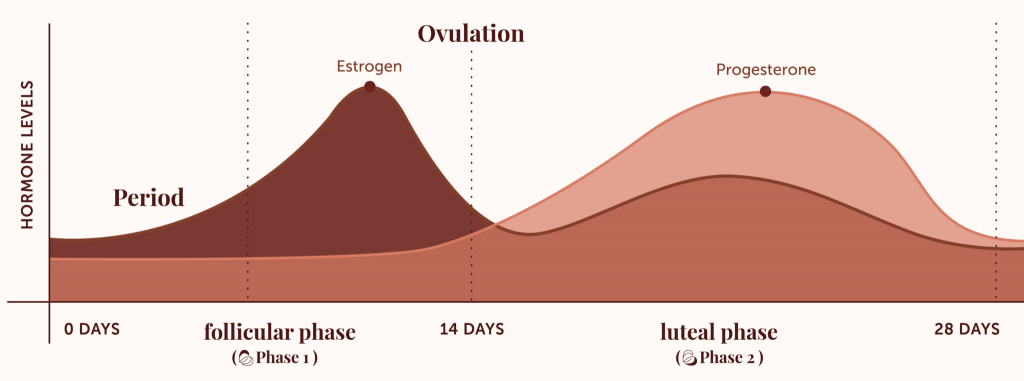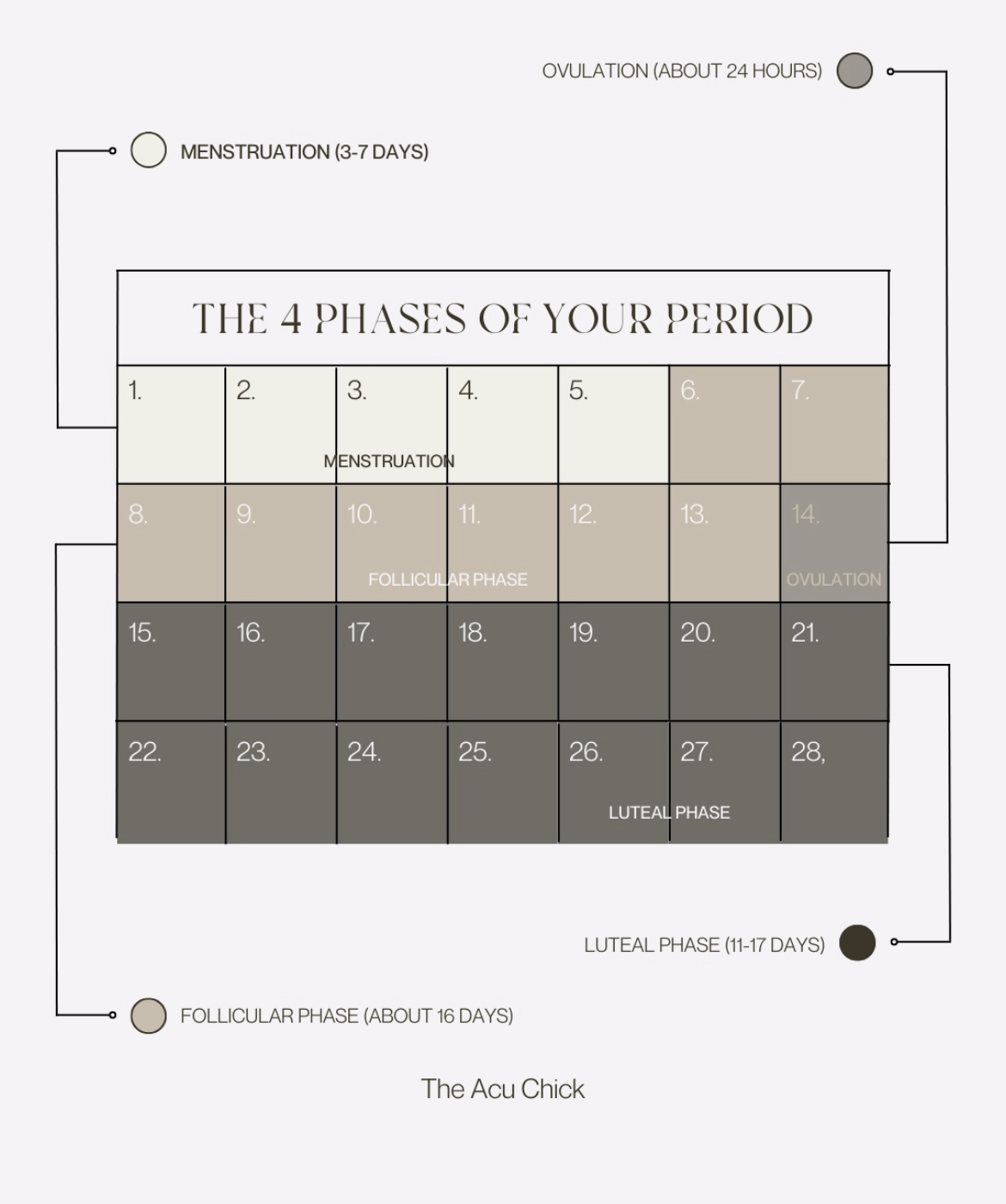Understanding Your Menstrual Cycle: Exploring the 4 Phases
Many women often find themselves confused about their PMS symptoms and the various phases of their menstrual cycle. Whether it’s light or heavy flow, pain, or irregularities, every woman’s experience is unique.
In reality, our menstrual cycle is not a simple one-phase process; it’s more like a four-season year within a 28-day cycle. In this blog post, we’ll explore these four distinct phases, discuss the role of hormones, and draw insights from traditional Chinese medicine (TCM). Understanding these nuances can offer empowerment and flexibility when things don’t follow a precise pattern. Join us as we delve into the menstrual cycle and its connection with the seasons.

Phase 1: Menstruation
Embracing the Essence of Winter

Hormones
In the first part of your period, which is the start of your menstrual cycle, your estrogen and progesterone levels are at their lowest. Your body is getting rid of the lining in your uterus, which was all set for a potential pregnancy in the previous cycle. This process, along with some hormonal changes, can make you feel crampy, tired, and moody because your body releases prostaglandins, which make your uterus contract. Even though it might not seem like much is happening, this phase is essential for your body to reset and get ready for the next stages of your menstrual cycle.
TCM- The Renewal of Yin
This phase embodies the Renewal of Yin in TCM. It is a time of shedding the old, letting go of what is no longer needed, and making space for the new. This phase often brings sensations of release, accompanied by cramps, fatigue, and emotional fluctuations. In TCM, these symptoms are attributed to a relative excess of Yang energy. To provide comfort during this phase, TCM advises embracing warmth, nurturing oneself, and consuming Yin-enriching foods like dark leafy greens and nourishing soups.
Supportive Nutrition and Herbs During Menstruation
- Dark Leafy Greens (Spinach, Kale, Collard Greens): These greens are rich in iron and essential nutrients. Iron helps replenish blood lost during menstruation, preventing anemia and fatigue.
- Bone Broth: Bone broth is a Yin-nourishing food that provides essential nutrients like collagen, gelatin, and minerals. It helps replenish Yin and supports the body’s need for nourishment during menstruation.
- Black Sesame Seeds: Black sesame seeds are considered a Yin-enhancing food in TCM. They are rich in calcium, iron, and healthy fats, which help nourish the body and replenish lost energy.
- Ginger: Ginger is known for its warming properties and can help alleviate menstrual cramps and discomfort. It also promotes healthy circulation, which can be beneficial during menstruation.
- Raspberry Leaf: Raspberry leaf tea is believed to strengthen the uterine muscles and may help reduce heavy menstrual bleeding and cramps.
- Chamomile: Chamomile tea has calming properties and can help relax the body and reduce tension and anxiety, which may be heightened during menstruation.
Phase 2: Follicular Phase
Blossoming in Spring

Hormones
After your period, the follicular phase begins, marked by a surge in hormones. Follicle-stimulating hormone (FSH) prompts the ovaries to grow tiny sacs called follicles, each containing an immature egg that releases estrogen. This rise in estrogen readies your body for potential ovulation and increases fertility. Luteinizing hormone (LH) responds to rising estrogen, triggering the release of a mature egg. This hormone surge and nearing ovulation often bring increased energy and mood improvement, setting the stage for the next phase.
TCM- The Awakening of Yang
As your period ends, you enter the follicular phase, which is like a reboot with a boost in energy and mood. Traditional Chinese Medicine (TCM) suggests eating Yang-enhancing foods like ginger and garlic during this time. It’s perfect for getting active and being creative!
Supportive Nutrition and Herbs During The Follicular Phase
- Leafy Greens (Spinach, Kale, Swiss Chard): Leafy greens are packed with vitamins and minerals, such as folate and iron, that help promote overall vitality and energy. They also contain antioxidants that support the body’s natural detoxification processes.
- Citrus Fruits (Oranges, Grapefruits, Lemons): Citrus fruits are refreshing and have a cooling effect, which can help balance the rising Yang energy. They are rich in vitamin C, which supports the immune system and collagen production.
- Fresh Herbs (Basil, Mint, Cilantro): Fresh herbs add flavor and aroma to dishes while providing essential vitamins and minerals. Mint, in particular, has a cooling effect, which can be beneficial during this phase.
- Walnuts: Walnuts are considered a Yin-nourishing food in TCM. They are rich in healthy fats, vitamins, and minerals, which help support the body’s energy and vitality.
- Maca Root: Maca root is often used to support hormonal balance and vitality. It may help regulate the menstrual cycle and support reproductive health.
- Licorice Root: Licorice root can help regulate hormones and support the adrenal glands, which play a role in overall energy and vitality.
Phase 3: Ovulation
Radiance of Summer

Hormones
Ovulation is the high point of your menstrual cycle. It’s when your ovary release a mature egg. High levels of estrogen lead to surges in LH and FSH hormones, which tell your body it’s time to let that egg go. This usually happens in the middle of your cycle. Ovulation can give you more energy, sharper senses, and a general sense of vitality, getting everything ready for possible pregnancy.
TCM: The Peak of Yang
In Traditional Chinese Medicine (TCM), it’s important to keep your Yin and Yang balanced during this time. Having a bit too much Yang might make you feel irritable or cause breast tenderness and headaches. To stay in balance, TCM suggests you steer clear of super spicy or heating foods and go for cooler, Yin-boosting options like cucumber and watermelon.
Supportive Nutrition and Herbs During Ovulation
- Leafy Greens (Spinach, Kale, Collard Greens): Leafy greens are rich in folate, iron, and other essential nutrients that promote overall vitality and balance in the body. They also provide the necessary nourishment for the reproductive system.
- Eggplant: Eggplant is considered a cooling food in TCM, which can help balance the rising Yang energy during ovulation. It is also rich in vitamins and antioxidants.
- Asparagus: Asparagus is known for its cooling properties and is believed to help regulate hormonal imbalances. It’s a nutritious vegetable that supports reproductive health.
- Coconut: Coconut is cooling and provides healthy fats that nourish the body. It can help soothe inflammation and promote hormonal balance.
- Peaches: Peaches are considered a Yin-enhancing fruit in TCM. They help cool the body and provide natural sweetness, supporting overall balance during the ovulation phase.
- Mint: Mint has cooling properties that can help alleviate heat-related symptoms that may occur during ovulation. It also adds a refreshing flavor to beverages and dishes.
Phase 4: The Luteal Phase
The Grace of Autumn

Hormones
After you’ve ovulated, the luteal phase steps in. It’s all about this thing called the corpus luteum, which comes from the old ovarian follicle that released the egg. The corpus luteum releases progesterone, a hormone that’s like a welcome mat for a possible baby in your uterus. Estrogen helps out here too. But if there’s no pregnancy, the corpus luteum slowly fades away, and that drop in progesterone and estrogen gets your period going, starting a new cycle
TCM: The Harmonious Equilibrium
Think of the luteal phase like the transition from summer to autumn. It’s about finding that balance between Yin and Yang, like the calm and colorful days of fall. Your body gets ready for either pregnancy or the next round. You might feel mood swings, bloating, or tender breasts – all part of this Yin-Yang dance. Traditional Chinese Medicine (TCM) recommends a balanced diet, some not-too-crazy exercise, and herbs like dong quai or shatavari to keep that equilibrium going smoothly.
Supportive Nutrition and Herbs During The Luteal Phase
- Sweet Potatoes: Sweet potatoes are grounding and nourishing. They provide complex carbohydrates and fiber, helping to stabilize blood sugar levels and reduce mood swings and irritability.
- Pumpkin Seeds: Pumpkin seeds are a Yin-nourishing food that provides essential nutrients like zinc and magnesium. They support relaxation and help reduce symptoms like breast tenderness.
- Squash: Squash varieties, such as butternut and acorn squash, are considered Yin-enhancing foods in TCM. They help soothe irritability and promote a sense of calm.
- Salmon: Fatty fish like salmon provide Omega-3 fatty acids, which have anti-inflammatory properties and help balance hormones.
- Lentils: Lentils are rich in iron and fiber, providing essential nutrients for energy and supporting blood production during the luteal phase.
- Chamomile Tea: Chamomile tea has calming properties and helps reduce anxiety and tension. It can be beneficial for mood swings and irritability.
- Nettle Leaf: Nettle leaf is a nourishing herb that provides essential vitamins and minerals. It supports overall well-being during the luteal phase.
- Lavender: Lavender is known for its calming and soothing properties. It can help reduce stress and promote relaxation.

Understanding the menstrual cycle is like recognizing the changing seasons in a 28-day journey. We’ve explored the four phases, hormones, and Traditional Chinese Medicine insights for empowerment and flexibility. Remember to listen to your body, eat right, and find hormonal harmony as you embrace your unique cycle. Acupuncture can also help regulate hormones and ease discomfort. So, just like the seasons, your menstrual cycle has its own rhythm, and understanding and care can bring grace and balance to each phase.



